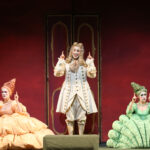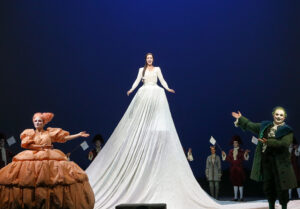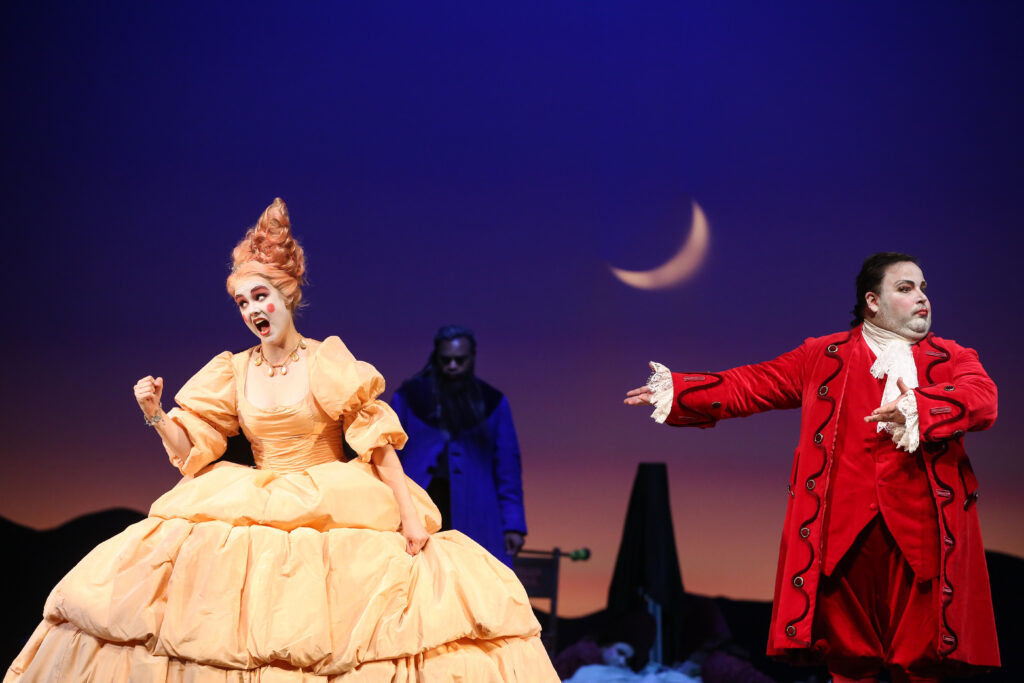She’s lying in a heap, sleeping, exhausted. Then, stoking the oven fire, Annelie Sophie Müller as Angelina, the step-daughter, incarcerated, the modern slave. She lugs logs, while her ridiculous sisters, like oversize cats, pose in fluffy outfits, like extras from the musical, (Cats). No one dances as I, sings Clorinda (Lauren Urquhart), she in pink, Tisbe (Stephanie Maitland), in fluorescent green.
In her cellar, Angelina sings her swansong, ‘Once upon a time there was a Prince’; she sings forlornly by the stove, and is silenced by her sisters.
In the Palace, a ‘beggar’ pleading for alms, is in fact Alidoro, (Aaron Pendleton), the Prince Ramiro’s magician and tutor. Ramiro’s (Timothy Fallon) advised to change clothes with his servant Dandini, to test prospective wives. (Ramiro must marry to come into his inheritance.)
Of course, in the parable, Angelina offers the beggar food and drink, while one of the sisters, sings she ‘can’t stand poverty, so cruel!’. Alidoro’s on a mission ‘to test the girls’ hearts’. But Ramiro wants his queen to marry for love, not for show. He sings warmly, Fallon’s virtuoso tenor impresses as Ramiro.
Men in red velvet blazers are peering out of a closet. Don Magnifico has squandered his fortune, and is seeking suitors for his daughters. They vie with each other, Clorinda (Urquhart) declares herself the most beautiful, as they push the beggar out. Don Magnifico (Misha Kiria), who looks as if he’s just got out of bed, has just dreamed one of the girls will marry a Baron! Kiria, a very fine (Georgian) baritone, organizes a feast to invite all the girls (to be vetted.)
 The twist in this ‘Cinderella’ is the double-bluff, the Prince switching with his servant. Dandini (Modestas Sedlevicius) – blonde, bewigged, white-powdered face- becomes the centre of attraction to test the family’s (ulterior) motives – thus heightening the comedy, with farcical results. Now the sisters, dressed in their outré, exaggerated hooped dresses, to impress their visitor. Angelina is side-lined, dwarfed beneath these towering sphinxes.
The twist in this ‘Cinderella’ is the double-bluff, the Prince switching with his servant. Dandini (Modestas Sedlevicius) – blonde, bewigged, white-powdered face- becomes the centre of attraction to test the family’s (ulterior) motives – thus heightening the comedy, with farcical results. Now the sisters, dressed in their outré, exaggerated hooped dresses, to impress their visitor. Angelina is side-lined, dwarfed beneath these towering sphinxes.
Dandini’s ‘Prince’ invites everyone to the banquet. Angelina asks to go, but brusquely refused by Magnifico. But Alidoro has a list of the household, showing a third daughter. Magnifico declares her ‘dead’. Brutally sexist, Kiria’s Baron threatens her with his sword, and pushes her down. She’s his ‘slave’. ‘Out of the comedy, a tragedy.’ Will she forever remain in ashes? Angelina creeps up on them. Please take me to the dance!
On a red stage, Dandini’s Prince disguised, the sisters falling over each other, curtsying, performing their social graces. Magnifico’s pompous prick, (Kiria) fat, chubby-faced, like an Oliver Hardy. And in the farce, a horse-drawn carriage crosses the stage, propelled by footmen in red livery. In the manic confusion, the party-goers form a circle to Rossini’s ever-accelerating climax.
But, as in the fairy tale, Alidoro’s ‘messenger’ assures Angelina everything will change: she’ll be ‘worthy’. Pendleton’s bass-baritone promises her a secret heaven. Now in her drab rags, she’s as if anointed under a white light. (He’s just called for his carriage.) She sings, she demands respect, as befitting one who wants to be his bride. What a beautiful soprano, Sophie Müller’s!
It must be a trick! ‘The scene deserves to be told’, (Alidoro). In the palace, who is she, the beauty, the veiled lady who says absolutely nothing. (They’re overcome by envy.) And when she reveals her face, dressed in dazzling white, she (Müller) sings with such coloratura, of how she despises show, and insincerity. Angelina, will have her voice: defiant, it’s like a ‘feminist’ proclamation. By contrast, the Baron, Kiria’s absurd figure of fun, sings, listing his titles, boasting of his wealth. Then Rossini’s glorious climax, as they’re all invited to the banquet.
Act 2 opens with the furious Magnifico, confused by the unknown beauty. He sings he’ll do anything for money and – with his daughters at his side- to promote their royal fortunes. (In the twist of the plot), Dandini’s fallen in love with Angelina, but Ramiro sees her refusing the in-disguise Prince because she loves his servant! She’s only interested in true love and fidelity, (she sings.) She offers the ‘servant’ one of her gold bangles so he’ll identify her, and exits. Having two Princes in disguise gives the comedy extra momentum. And we’re talking armbands, not slippers. Ramiro will find her, her love drives him to infatuation. Fallon declaims with breathtaking technique, in his aria, Treasure of love, of a sweet hope knocking in his heart.
But this is comedy,and in the farce. Dandini will reveal his ‘secret’ to Magnifico: he’s only a valet after all. The interaction between Dandini and Kiria’s Magnifico is astonishing in their comic timing. ‘It’s quite brilliant that a king should give up, wealth, status, social privilege for simplicity, honesty and love,’ proclaims Magnifico ironically. His ‘heart is beating like a contrabass’! We now hear Angelina’s refrain, ‘There once was a Prince who searched and found..‘
The background set is a surrealist landscape, like a Salvador Dali painting. The ensemble sing, ‘the confusion is great’. In my head, everything is turning round, and trying to resolve it only makes it worse! Magnifico orders Angelina to the kitchen, never to return. But Ramiro now discovers the second bangle on Angelina’s arm, and ‘asks for her hand’. Good triumphs, pride crumbles to dust, sing the Chorus. (While Magnifico tries vainly to re-divert the Prince to his ‘distinguished daughters’.)
 For Angelina, revenge is forgiveness. Müller sings with stunning coloratura, of how her life was changed- like lightning- from Magnifico’s second marriage. Now she’s proclaimed an angel. Unbelievable staging! Her white dress is raised on a plinth, and covers the stage in its dazzling purity. Everything is transformed, and with sighs of relief.
For Angelina, revenge is forgiveness. Müller sings with stunning coloratura, of how her life was changed- like lightning- from Magnifico’s second marriage. Now she’s proclaimed an angel. Unbelievable staging! Her white dress is raised on a plinth, and covers the stage in its dazzling purity. Everything is transformed, and with sighs of relief.
Those pastel coloured sets, as if hand-painted in watercolours, and the exquisitely delicate costumes, enhance this adult fairy tale, brought to life by Rossini’s brilliant score. Volksoper’s orchestra (Golstein) were world-class, tonight’s cast uniformly excellent. © PR 16.9.22
Photos: Lauren Urquart (Clorinda), Timothy Fallon (Don Ramiro); Lauren Urquhart, Modestas Sedleciviu (Dandini), Stephanie Maitland (Tisbe); Annelie Sophie Müller (Angelina); Featured image: Modestas Sedlevicius and Chorus
© Barbara Pálffy/Volksoper Wien

